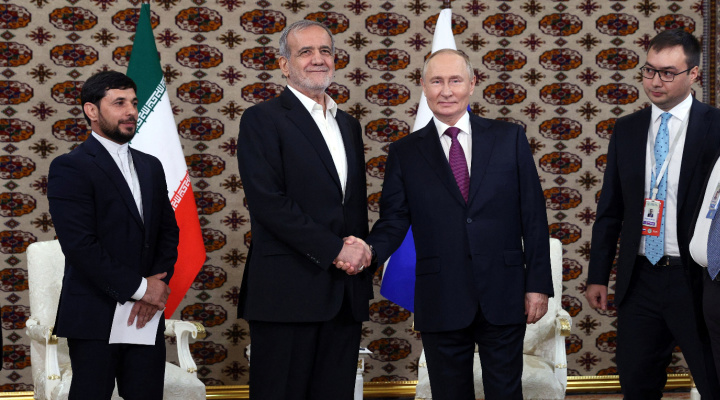Russian President Vladimir Putin meets Iranian counterpart Masoud Pezeshkian on the sidelines of a cultural forum dedicated to the 300th anniversary of the birth of the Turkmen poet and philosopher Magtymguly Fragi, in Ashgabat, Turkmenistan, Oct. 11, 2024. Photo: Sputnik/Alexander Scherbak/Pool via REUTERS
On August 24, 1939 — almost exactly 86 years ago — Soviet Foreign Minister Vyacheslav Molotov and German Foreign Minister Joachim von Ribbentrop signed the Treaty of Non-Aggression between Germany and the USSR, henceforth known as the “Molotov-Ribbentrop Pact.”
The Pact divided Europe into two spheres of influence between Nazi Germany and the USSR.
The diplomatic achievement, which was much celebrated between the signing of the Pact and Germany’s invasion on June 22, 1941, proved to be a terrible mistake.
In retrospect, having large neutral Poland in between, would have served the USSR much better, preventing the devastating surprise Nazi attack that almost collapsed its army.
The ghost of that Pact is exactly what makes Vladimir Putin, a student of Stalin, unable to sign a peace agreement with Ukraine, even if he tactically believes a timeout is warranted.
Not only has the war failed to move the Russian border much to the West, but any peace agreement will likely place NATO-like troops right on the border with Russia, across the entire Ukrainian frontier.
That is precisely one of the reasons Vladimir Putin started the war: to prevent NATO from settling in Ukraine. Putin thinks any surrender could embolden his enemies, and that’s why he won’t give in.
How did Stalin deal with his tragic mistake? For one, right after Germany attacked, Stalin vowed never to make it again, and he had a plan for the post-war Western border even when Germans were besieging Moscow, and it looked like the war might be lost.
Stalin’s plan envisaged a huge buffer zone consisting of Eastern European countries forcefully aligned with the USSR — with the distance covering half of the European continent, so no surprise attack against the USSR could take place from London, Paris, or Bonn.
This is, on a smaller scale, what Vladimir Putin planned for Ukraine.
For Putin, Ukraine is a runaway inmate to be caught, punished, and brought back.
Just as Soviet leaders of yesteryear could not imagine the USSR’s security without Czechoslovakia and Hungary being on “this side of the border,” Putin can’t imagine modern Russia’s strategic stability without Ukraine on its side.
During the 20th century, there was a fear of a US or European war against Russia. Today, that idea seems ludicrous to everyone, except one man: Vladimir Putin.
This belief in a continuous threat coming from the West is not based in rational logical thinking; it is an article of faith. It is a religious belief, and as such, cannot be rationally argued. This is what many Westerners fail to recognize: Vladimir Putin’s politics is not the product of a long careful analysis — it is the product of a deep cultural crisis overtaking Russia since the late 19th century and accelerated by the Bolshevik coup.
Why is this important? Vladimir Putin has, in his own words, described his pathological antipathy towards the Ukrainian national project. He does not believe Ukraine is a country, Ukrainians are a people, or that Ukrainian is a language.
He does not believe the country has the right to exist within any borders. These attitudes are difficult to “negotiate” with. Yet even if we hypothetically assume Ukraine were to abandon all its national characteristics, start speaking only Russian, and call its people Russians, Vladimir Putin would still not agree to Ukraine’s real political independence.
In Vladimir Putin’s view, any independent Ukraine is a lethal threat to Russia’s security.
The author lives and works in Silicon Valley, California. He is a founding member of San Francisco Voice for Israel.
Click this link for the original source of this article.
Author: Lev Stesin
This content is courtesy of, and owned and copyrighted by, https://www.algemeiner.com and its author. This content is made available by use of the public RSS feed offered by the host site and is used for educational purposes only. If you are the author or represent the host site and would like this content removed now and in the future, please contact USSANews.com using the email address in the Contact page found in the website menu.





